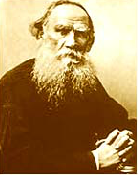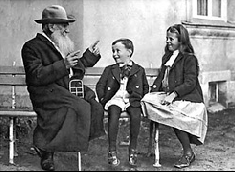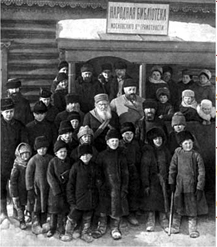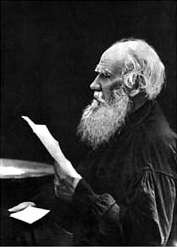Listen to Tolstoy
What you are about to hear is not a fabrication. It is not an imitation. It is the ACTUAL LIVING VOICE of Leo Tolstoy, recorded in 1909 on one the very first gramophones ever to exist in Russia.
 “Thoughts for Everyday”
“Thoughts for Everyday”
In this audio selection Tolstoy reads from his famous compilation of daily wisdom, “Thoughts for Everyday.” Tolstoy, who knew English, French, and German, translated the passage himself, and he speaks in English with a Russian accent. Listen and follow along in the text below:
“That the object of life is self-perfection, the perfection of all immortal souls, that this is the only object of my life, is seen to be correct by the fact alone that every other object is essentially a new object. Therefore, the question whether thou hast done what thou should’st have done is of immense importance, for the only meaning of thy life is in doing in this short term allowed thee, that which is desired of thee by He or That which has sent thee into life. Art thou doing the right thing?”
 “The Wolf”
“The Wolf”
Tolstoy loved to entertain children with fairy tales about exotic people, animals, and even vegetables. The picture to the left shows Tolstoy making his grandchildren laugh with a story about a cucumber — yes a cucumber! Listen in as Tolstoy reads from another one of his famous fairy tales, “The Wolf.”
 Tolstoy Teaches the Peasant Children on His Estate
Tolstoy Teaches the Peasant Children on His Estate
Tolstoy believed that quality education should be available to everybody, not just to the priviledged few. That’s why he created a school for peasant children on his Yasnaya Polyana estate and helped to create libraries in his local community. The picture to the left shows Tolstoy at the inauguration of “The Library for the People” he helped to found at Yasnaya Polyana. Tolstoy died only a few months after this picture was taken.
Listen in as Tolstoy teaches the peasant students in his Yasnaya Polyana School for the People.
 Tolstoy Reads from His Famous Essay, “I Cannot Be Silent”
Tolstoy Reads from His Famous Essay, “I Cannot Be Silent”
Tolstoy was a passionate social activist, who used the power of his pen to fight social injustices and human rights violations in Russia in the nineteenth and early twentieth centuries. One powerful essay, which became known internationally, was called “I Cannot Be Silent.” In this essay Tolstoy expressed his moral outrage over the government’s policy of executing criminals and political dissidents. The event that finally compelled Tolstoy to write the essay was the court’s decision in 1908 to execute twenty peasants who assaulted their landowner. Tolstoy was 80 years old at the time. Listen in as Tolstoy reads from his famous political protest essay, “I Cannot Be Silent.”
